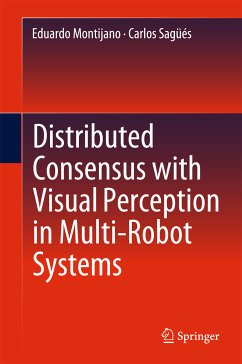Distributed Consensus with Visual Perception in Multi-Robot Systems covers a variety of related topics such as:
· distributed consensus algorithms;
· data association and robustness problems;
· convergence speed; and
· cooperative mapping.
The book first puts forward algorithmic solutions to these problems and then supports them with empirical validations working with real images. It provides the reader with a deeper understanding of the problems associated to the perception of the world by a team of cooperating robots with onboard cameras.
Academic researchers and graduate students working with multi-robot systems, or investigating problems of distributed control or computer vision and cooperative perception will find this book of material assistance with their studies.
Dieser Download kann aus rechtlichen Gründen nur mit Rechnungsadresse in A, B, BG, CY, CZ, D, DK, EW, E, FIN, F, GR, HR, H, IRL, I, LT, L, LR, M, NL, PL, P, R, S, SLO, SK ausgeliefert werden.









